First Published on February 6th, 2023 by Bob Ciura for SureDividend. Spreadsheet data updated daily
Real estate investment trusts – or REITs, for short – can be fantastic securities for generating meaningful portfolio income. REITs widely offer higher dividend yields than the average stock.
While the S&P 500 Index on average yields less than 2% right now, it is relatively easy to find REITs with dividend yields of 5% or higher.
The following downloadable REIT list contains a comprehensive list of U.S. Real Estate Investment Trusts, along with metrics that matter including:
- •Stock price
- •Dividend yield
- •Market capitalization
- •5-year beta
You can download your free 200+ REIT list (along with important financial metrics like dividend yields and payout ratios) by clicking on the link below:

In addition to the downloadable Excel sheet of all REITs, this article discusses why income investors should pay particularly close attention to this asset class. And, we also include our top 7 REITs today based on expected total returns.
Table Of Contents
In addition to the full downloadable Excel spreadsheet, this article covers our top 7 REITs today, as ranked using expected total returns from The Sure Analysis Research Database.
The table of contents below allows for easy navigation.
- •How To Use The REIT List
- •Why Invest In REITs?
- •REIT Financial Metrics
- •The Top 7 REITs Today
#7: Medical Properties Trust (MPW)
#6: Brandywine Realty Trust (BDN)
#5: Office Properties Income Trust (OPI)
#4: Clipper Realty (CLPR)
#3: Uniti Group (UNIT)
#2: Douglas Emmett (DEI)
#1: Innovative Industrial Properties Trust (IIPR)
How To Use The REIT List To Find Dividend Stock Ideas
REITs give investors the ability to experience the economic benefits associated with real estate ownership without the hassle of being a landlord in the traditional sense.
Because of the monthly rental cashflows generated by REITs, these securities are well-suited to investors that aim to generate income from their investment portfolios. Accordingly, dividend yield will be the primary metric of interest for many REIT investors.
For those unfamiliar with Microsoft Excel, the following images show how to filter for REITs with dividend yields between 5% and 7% using the ‘filter’ function of Excel.
Click here to download your Complete REIT Excel Spreadsheet List now. Keep reading this article to learn more.
Step 1: Download the Complete REIT Excel Spreadsheet List at the link above.
Step 2: Click on the filter icon at the top of the ‘Dividend Yield’ column in the Complete REIT Excel Spreadsheet List.

Step 3: Use the filter functions ‘Greater Than or Equal To’ and ‘Less Than or Equal To’ along with the numbers 0.05 ad 0.07 to display REITs with dividend yields between 5% and 7%.
This will help to eliminate any REITs with exceptionally high (and perhaps unsustainable) dividend yields.
Also, click on ‘Descending’ at the top of the filter window to list the REITs with the highest dividend yields at the top of the spreadsheet.
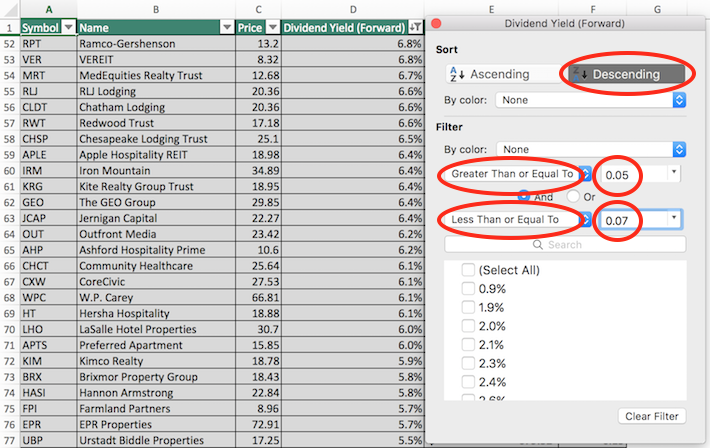
Now that you have the tools to identify high-quality REITs, the next section will show some of the benefits of owning this asset class in a diversified investment portfolio.
Why Invest in REITs?
REITs are, by design, a fantastic asset class for investors looking to generate income.
Thus, one of the primary benefits of investing in these securities is their high dividend yields.
The currently high dividend yields of REITs is not an isolated occurrence. In fact, this asset class has traded at a higher dividend yield than the S&P 500 for decades.
Related: Dividend investing versus real estate investing.
The high dividend yields of REITs are due to the regulatory implications of doing business as a real estate investment trust.
In exchange for listing as a REIT, these trusts must pay out at least 90% of their net income as dividend payments to their unitholders (REITs trade as units, not shares).
Sometimes you will see a payout ratio of less than 90% for a REIT, and that is likely because they are using funds from operations, not net income, in the denominator for REIT payout ratios (more on that later).
REIT Financial Metrics
REITs run unique business models. More than the vast majority of other business types, they are primarily involved in the ownership of long-lived assets.
From an accounting perspective, this means that REITs incur significantnon-cash depreciation and amortization expenses.
How does this affect the bottom line of REITs?
Depreciation and amortization expenses reduce a company’s net income, which means that sometimes a REIT’s dividend will be higher than its net income, even though its dividends are safe based on cash flow.
Related: How To Value REITs
To give a better sense of financial performance and dividend safety, REITs eventually developed the financial metric funds from operations, or FFO.
Just like earnings, FFO can be reported on a per-unit basis, giving FFO/unit – the rough equivalent of earnings-per-share for a REIT.
FFO is determined by taking net income and adding back various non-cash charges that are seen to artificially impair a REIT’s perceived ability to pay its dividend.
For an example of how FFO is calculated, consider the following net income-to-FFO reconciliation from Realty Income (O), one of the largest and most popular REIT securities.
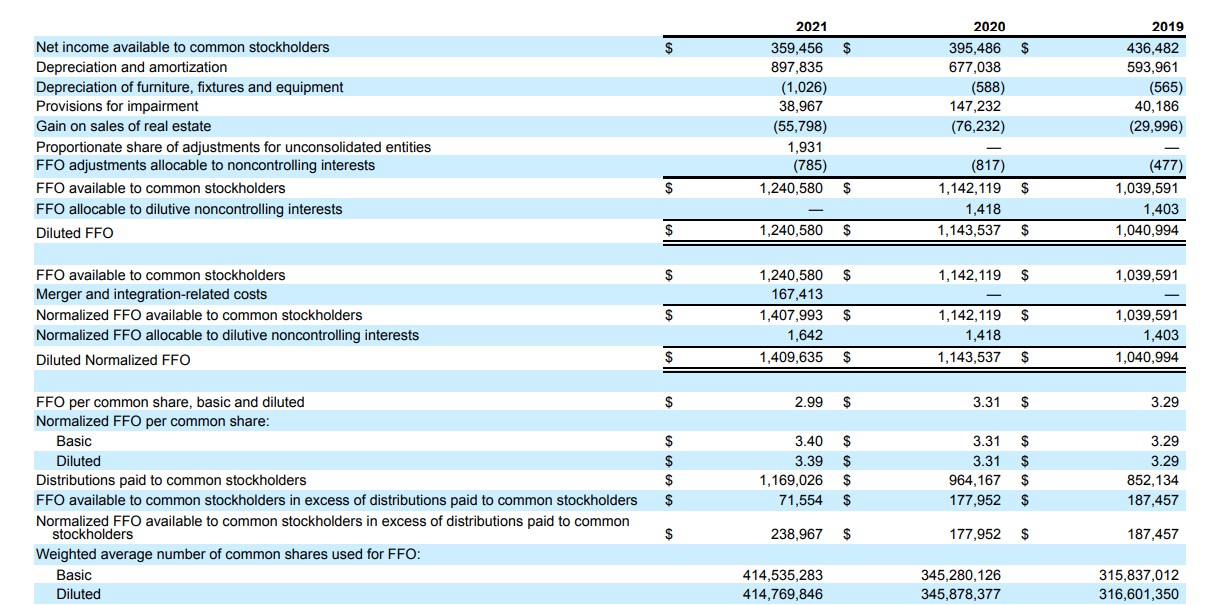
Source: Realty Income Annual Report
In 2021, net income was $359 million while FFO available to stockholders was above $1.4 billion, a sizable difference between the two metrics. This shows the profound effect that depreciation and amortization can have on the GAAP financial performance of real estate investment trusts.
The Top 7 REITs Today
Below we have ranked our top 7 REITs today based on expected total returns.
Expected total returns are in turn made up from dividend yield, expected growth on a per unit basis, and valuation multiple changes. Expected total return investing takes into account income (dividend yield), growth, andvalue.
Note: The REITs below have not been vetted for safety. These are high expected total return securities, but they may come with elevated risks.
We encourage investors to fully consider the risk/reward profile of these investments.
For the Top 10 REITs each month with 4%+ dividend yields, based on expected total returns and safety, see our Top 10 REITs service.
Top REIT #7: Medical Properties Trust (MPW)
- •Expected Total Return: 18.0%
- •Dividend Yield: 9.1%
Founded in 2003, Medical Properties Trust is the only pure-play hospital REIT today. It owns a diversified portfolio of over 400 properties which are leased to over 30 different operators. The great majority of the assets are general acute care hospitals, but show some diversification into other specialty hospitals, including inpatient rehabilitation and long-term acute care.
The portfolio of assets is also well diversified across different geographies with properties in 29 states to mitigate the risk of demand and supply imbalances in individual markets.
On top of its US portfolio, Medical Properties maintains a strategic exposure to key European markets, including Germany, the UK, Italy, and Australia. It currently trades at a market capitalization of ~$7 billion.
On October 27th, Medical Properties reported Q3 FFO of $0.45 per share. Revenue of $352.34M (-9.8% Y/Y) missed analyst consensus estimates by $36.68M. The company is increasing its estimate of 2022 per share net income to a range of $1.99 to $2.01 and is also tightening its estimate of 2022 per share NFFO to $1.80 to $1.82 from a prior range of $1.78 to $1.82 vs. consensus of $1.82.
Click here to download our most recent Sure Analysis report on MPW (preview of page 1 of 3 shown below):
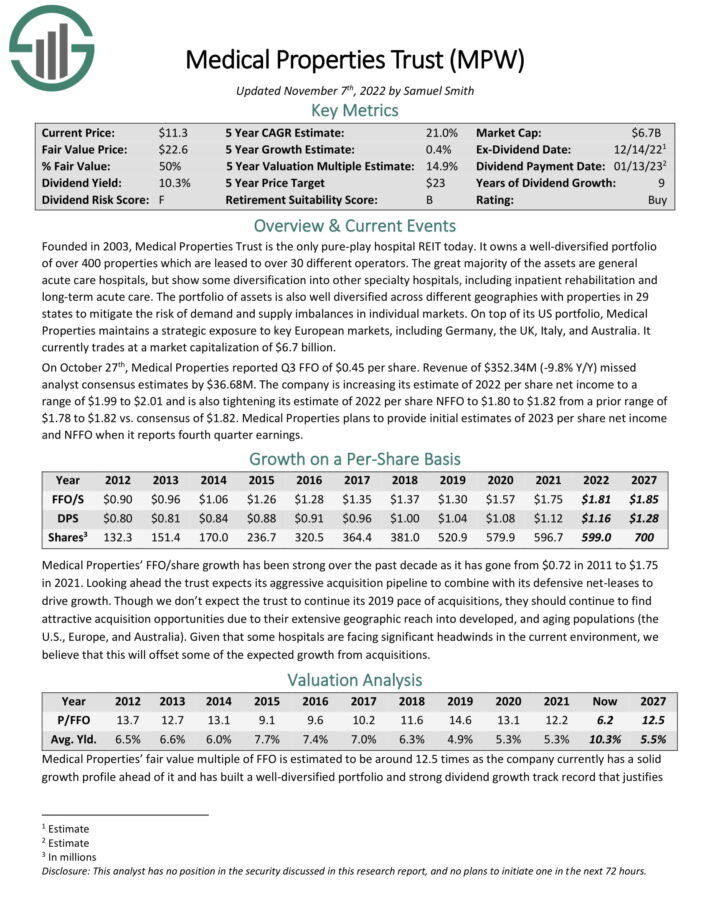
Top REIT #6: Brandywine Realty Trust (BDN)
- •Expected Total Return: 18.4%
- •Dividend Yield: 9.1%
Brandywine Realty owns, develops, leases and manages an urban town center and transit-oriented portfolio which includes 163 properties in Philadelphia, Austin and Washington, D.C. The REIT has a market capitalization of $1.1 billion and generates 74% of its operating income in Philadelphia, 22% of its operating income in Austin and the remaining 4% in Washington, D.C.
As Brandywine Realty Trust generates the vast portion of its operating income in Philadelphia and Austin, it is worth noting the advantages of these two areas. According to official reports, Philadelphia has the highest growth rate of highly educated citizens since 2008 while Austin is the fastest-growing metropolitan area, the best place to start business and it has retrieved all the jobs lost due to the pandemic.
In early February, Brandywine Realty Trust reported (2/1/23) financial results for the fourth quarter of fiscal 2022. Its occupancy slipped sequentially from 90.8% to 89.8% and its funds from operations (FFO) per share dipped from $0.36 to $0.32, in line with the analysts’ consensus. This was the first quarter in which the impact of rising interest rates on interest expense was evident.
As the REIT faces debt maturities, it has to issue new debt at high interest rates. Due to this headwind and its high debt load, the stock has plunged 47% over the last 12 months, to a 13-year low. Due to high interest expense, management provided guidance for FFO per share of $1.12-$1.20 in 2023.
Click here to download our most recent Sure Analysis report on BDN (preview of page 1 of 3 shown below):
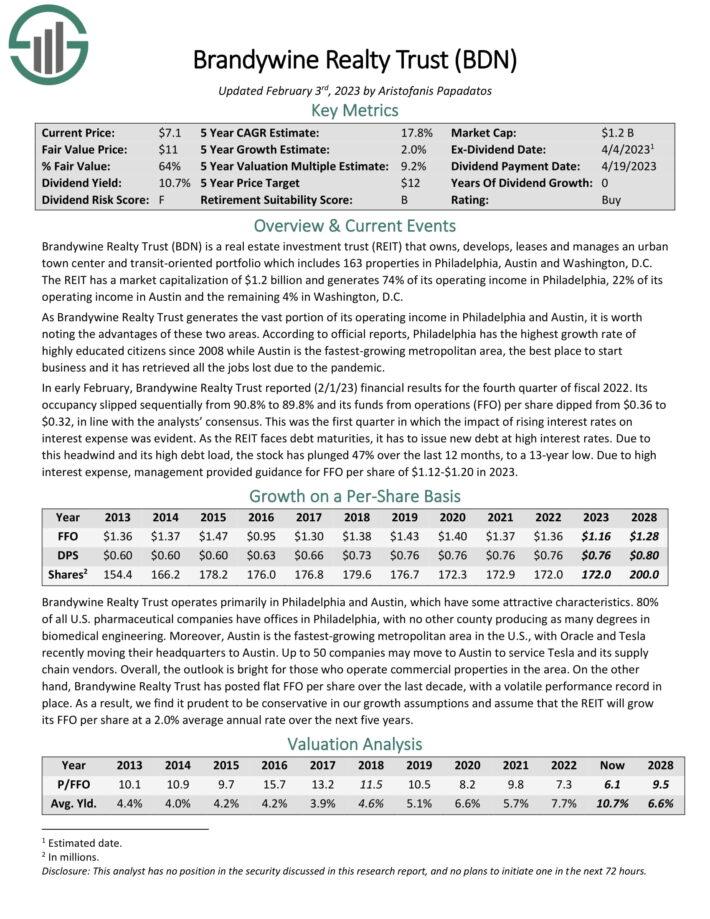
Top REIT #5: Office Properties Income Trust (OPI)
- •Expected Total Return: 19.4%
- •Dividend Yield: 12.7%
Office Properties Income Trust owns 178 buildings, which are primarily leased to single tenants with high credit quality. The REIT’s portfolio currently has a 94.3% occupancy rate and an average building age of 17 years. The U.S. Government is the largest tenant of OPI, as it represents 20% of the annual rental income of the REIT.
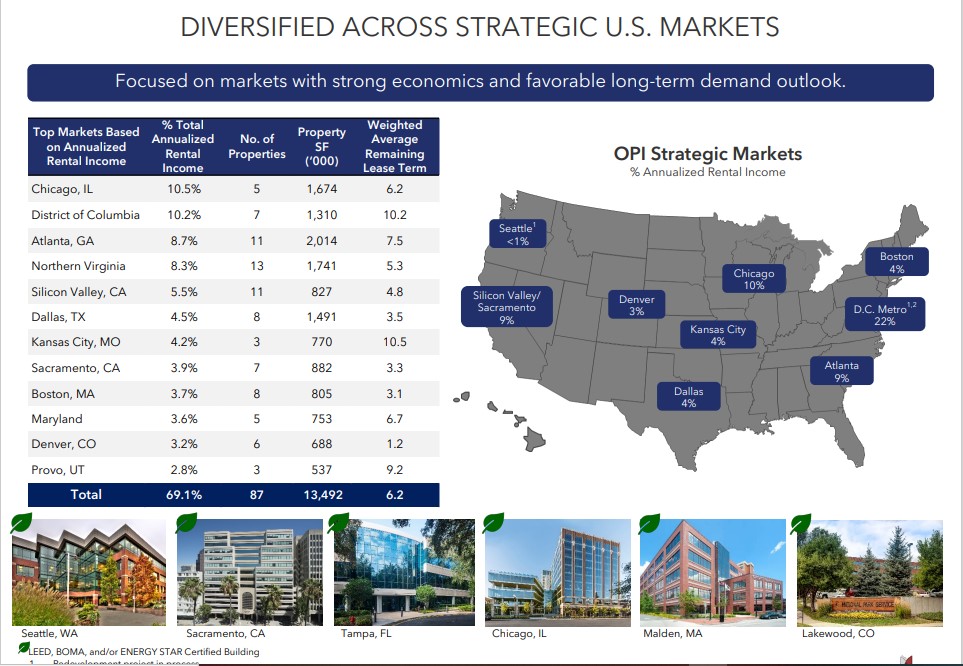
Source: Investor Presentation
In late October, OPI reported (10/27/2022) financial results for the third quarter of fiscal 2022. The occupancy rate fell sequentially from 94.3% to 90.7% and normalized funds from operations (FFO) per share dipped -10% over the prior year’s quarter, from $1.24 to $1.11.
OPI generates 64% of its annual rental income from investment-grade tenants. This is one of the highest percentages of rent paid by investment-grade tenants in the REIT sector. Moreover, U.S. Government tenants generate about 20% of total rental income and no other tenant accounts for more than 4% of annual income. This exceptional credit profile constitutes a meaningful competitive advantage.
On the other hand, OPI has greatly increased its debt load after its latest acquisition. Its net debt is excessive, as it stands at $2.4 billion, which is about 11 times the annual funds from operations and more than triple the current market capitalization of the REIT. Fortunately, OPI is in the process of selling assets and is likely to drive its leverage to healthier levels in the near future. Still, a severe downturn could result in a dividend cut.
Click here to download our most recent Sure Analysis report on OPI (preview of page 1 of 3 shown below):
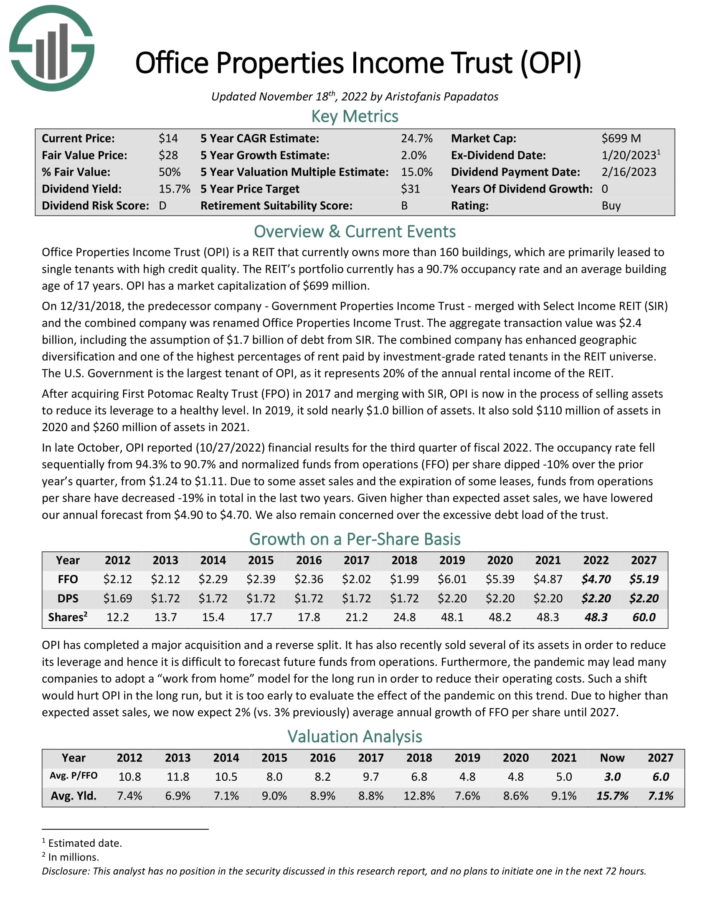
Top REIT #4: Clipper Realty (CLPR)
- •Expected Total Return: 19.5%
- •Dividend Yield: 5.4%
Clipper Properties is a REIT, that was founded by the merger of four preexisting real estate companies. The founders retain about 2/3 of the ownership and votes today as they have never sold a share, thereby causing some corporate governance concerns but also giving investors knowledge that the insiders are heavily incentivized to look out for shareholder interests. Clipper Properties owns commercial (primarily multifamily and office with a small sliver of retail) real estate across New York City.
On November 9th, Clipper Properties released third quarter results. The REIT posted record quarterly revenues of $32.8 million for the third quarter of 2022. Quarterly income from operations came in at $7.3 million and the company generated record net operating income of $17.4 million. Quarterly adjusted funds from operations were $5.0 million for the third quarter of 2022. Management declared a dividend of $0.095 per share for the third quarter of 2022.
Click here to download our most recent Sure Analysis report on CLPR (preview of page 1 of 3 shown below):
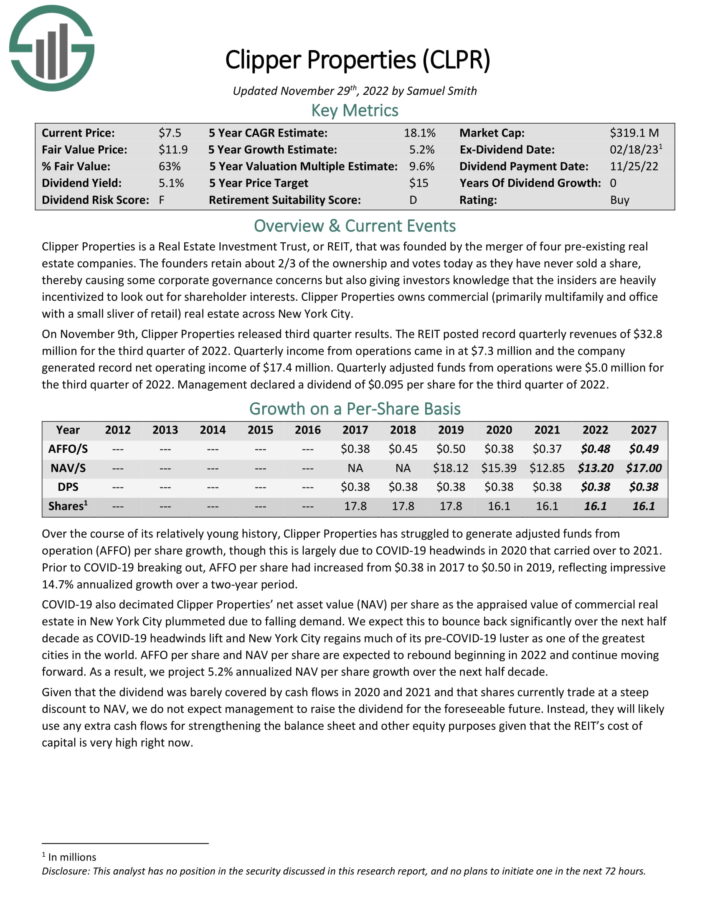
Top REIT #3: Uniti Group (UNIT)
- •Expected Total Return: 19.9%
- •Dividend Yield: 9.2%
Uniti Group is a Real Estate Investment Trust (i.e., REIT) that focuses on acquiring, constructing, and leasing out communications infrastructure in the United States. In particular, it owns millions of miles of fiber strand along with other communications real estate. In its recent past it has faced challenges due to its largest tenant filing for bankruptcy and renegotiating its lease with Uniti. However, the REIT is now on firmer footing and is pursuing growth opportunities.
On November 3rd, Uniti Group reported Q3 results. Consolidated revenues were $283.1 million. The net loss and Adjusted EBITDA were $155.7 million and $225.1 million, respectively, for the same period. Net loss attributable to common shares was $155.9 million for the period, and includes a $216.0 million goodwill impairment charge related to the Uniti Fiber segment that was driven by an increase in the macro interest rate environment.
Adjusted Funds From Operations was $112.6 million, or $0.43 per diluted common share. Uniti Fiber contributed $74.5 million of revenues and $28.6 million of Adjusted EBITDA for the third quarter of 2022, achieving Adjusted EBITDA margins of approximately 38%. Uniti Fiber’s net success-based capital expenditures during the quarter were $26.3 million.
Uniti Leasing contributed revenues of $208.6 million and Adjusted EBITDA of $203.2 million for the third quarter, representing growth of 4.6% for each when compared to the third quarter of 2021. During the quarter, Uniti Leasing deployed capital expenditures of $71.9 million, primarily related to the construction of approximately 2,250 new route miles of valuable fiber infrastructure.
Click here to download our most recent Sure Analysis report on UNIT (preview of page 1 of 3 shown below):
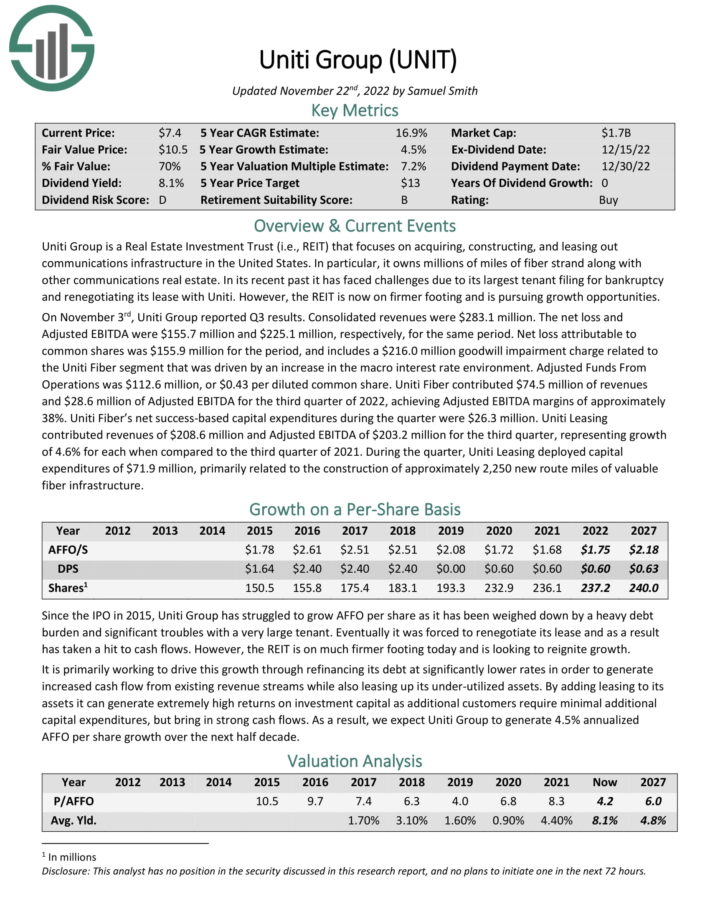
Top REIT #2: Douglas Emmett (DEI)
- •Expected Total Return: 20.0%
- •Dividend Yield: 4.5%
Douglas Emmett is the largest office landlord in Los Angeles and Honolulu, with a 38% average market share of office space in its sub-markets. The REIT generates 86% of its revenue from its office portfolio and 14% of its revenue from its multifamily portfolio. It has approximately 2,700 office leases in its portfolio, with annual revenue of $1 billion.
The merits of being the largest office landlord in Los Angeles are obvious, as Los Angeles County is the third-largest city in the world, with GDP of $1 trillion, behind only Tokyo and New York.
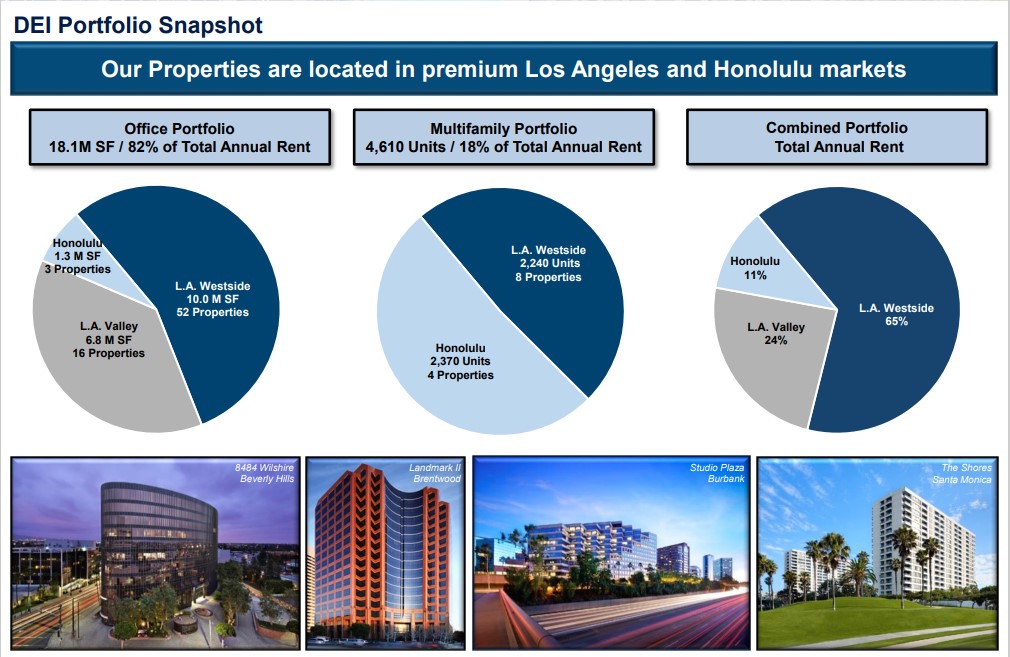
Source: Investor Presentation
In addition, the REIT benefits from high barriers to entry, which reduce competition. Moreover, the proximity to premier housing attracts affluent tenants, who offer reliable cash flows to the company.
In early November, Douglas Emmett reported (11/3/22) financial results for the third quarter of fiscal 2022. The trust continued to recover from the pandemic and thus leased more than 1,000,000 square feet in the quarter. Its multifamily portfolio remained essentially fully leased.
Revenue grew 6.5% and adjusted funds from operations (FFO) per share grew 7% over the prior year’s quarter. Management narrowed its guidance for FFO per share in 2022, from $2.03-$2.07 to $2.03-$2.05, implying 10% growth at the mid-point. The REIT expects its interest expense to increase next year due to higher interest rates. Fortunately, 87% of its debt is at fixed rates and there are no debt maturities until the end of 2024.
Click here to download our most recent Sure Analysis report on DEI (preview of page 1 of 3 shown below):
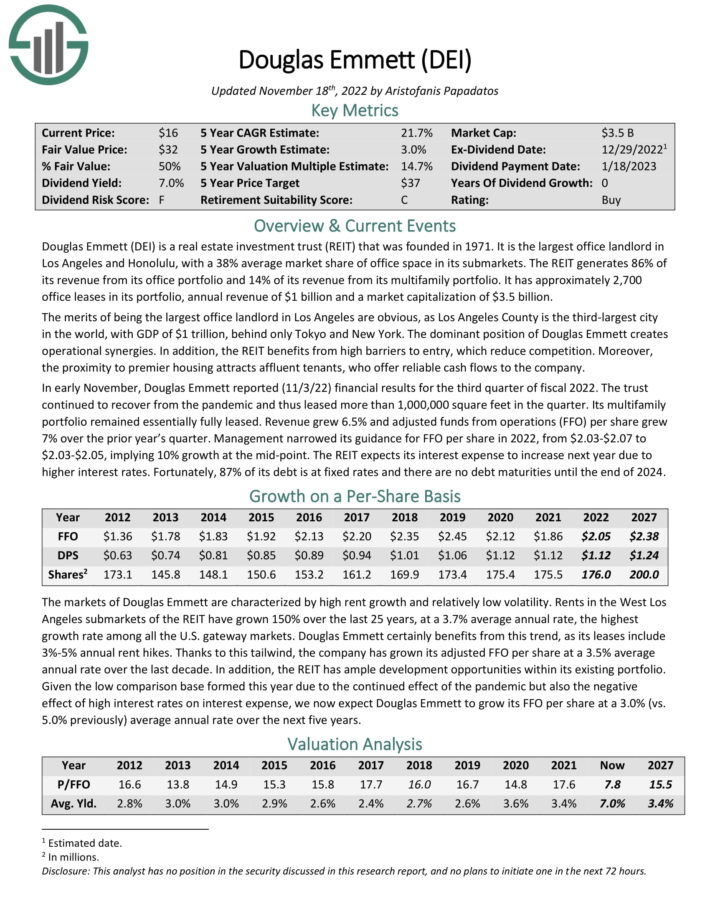
Top REIT #1: Innovative Industrial Properties (IIPR)
- •Expected Total Return: 26.8%
- •Dividend Yield: 7.7%
Innovative Industrial Properties, Inc. is a single-use “specialty REIT” that exclusively focuses on owning properties used for the cultivation and production of marijuana. Because the industry is in the midst of a legal transition, there are constraints on capital available to businesses engaged in the marijuana business.
Related: The Best Marijuana Stocks: List of 100+ Marijuana Industry Companies
The ongoing legalization of cannabis in the US has led to stunning returns and portfolio growth. The $2.8 billion REIT owns 111 properties in 19 states. Amid the cannabis boom over the past few years, as well as its exclusivity in terms of the listing giving the trust access to public markets, Innovate Industrial Properties remains one of the fastest-growing REITs in the world.
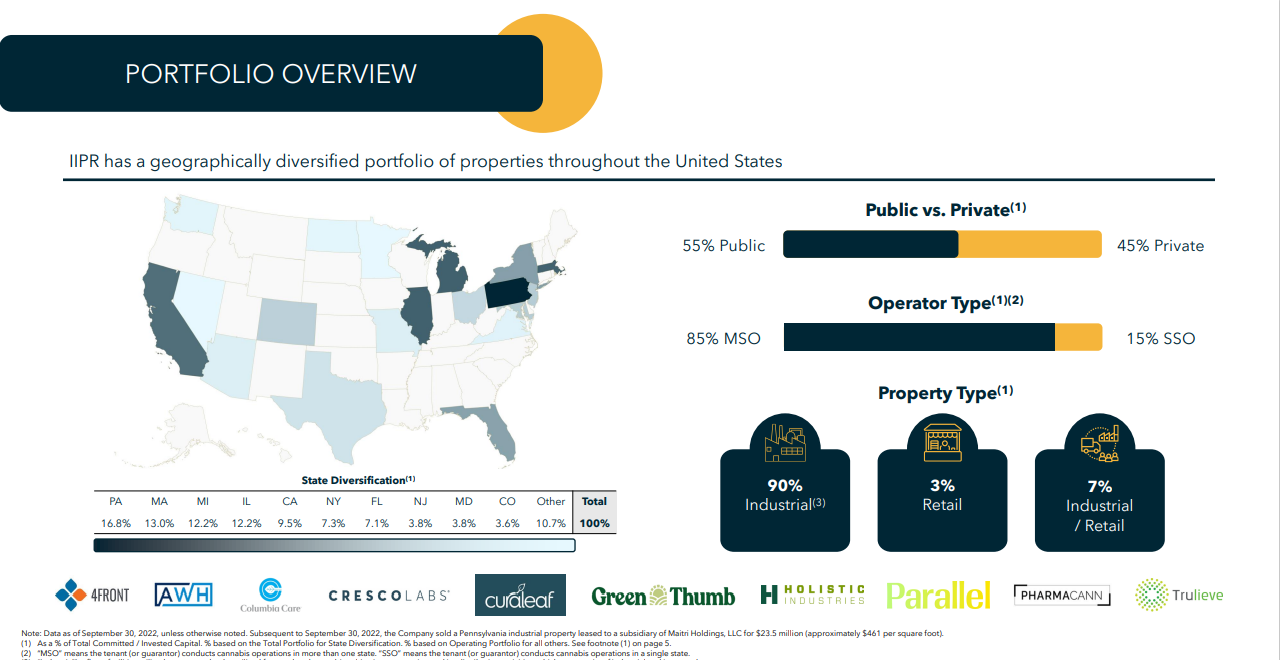
Source: Investor Presentation
On September 15th, 2022, Innovative Industrial increased its dividend by 2.9% to a quarterly rate of $1.80. The 2.9%
increase compares to the prior dividend rate. Year-over-year, it implies an increase of 20%.
On November 2nd, 2022, Innovative Industrial announced its Q3 earnings for the period ending September 30th, 2022. For the quarter, revenues and normalized AFFO/share were $70.9 million and $2.13, an increase of 31.6%, and 24.6%, respectively. The company delivered another quarter of very high growth, including acquiring an industrial property in Massachusetts. Contractual rental escalations at certain properties also boosted results.
As of September 30th, 100% of IIPR’s properties were leased with a weighted-average remaining lease term of approximately 15.5 years, half a year less than the previous quarter, but a still very impressive one. The company did not collect contractual rents totaling $5.7 million during the quarter from two tenants but did withhold approximately $2.6 million from their security deposits.
Click here to download our most recent Sure Analysis report on IIPR (preview of page 1 of 3 shown below).
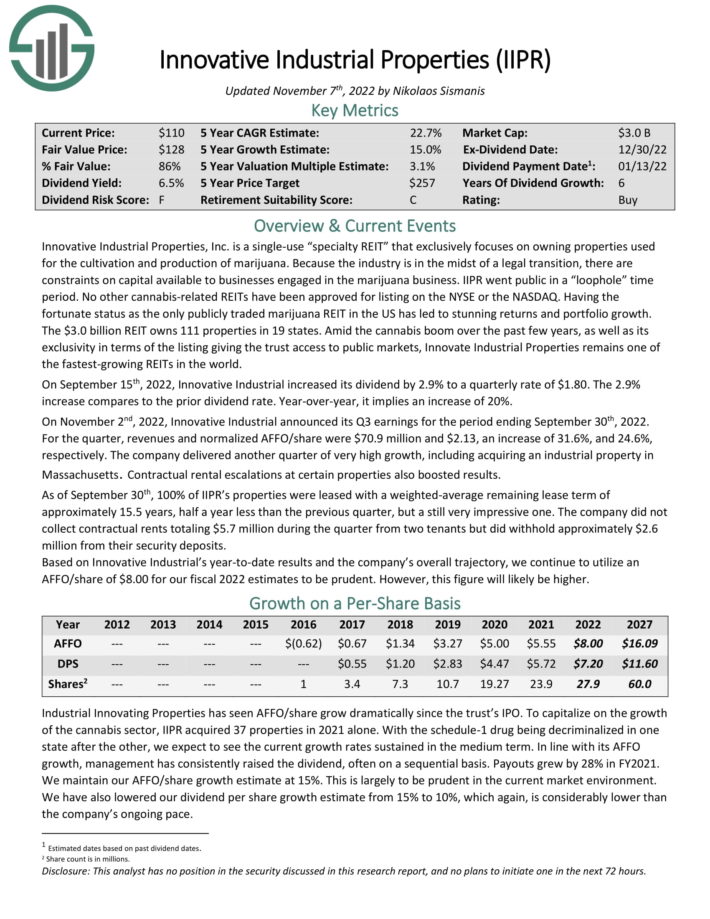
Final Thoughts
The REIT Spreadsheet list in this article contains a list of publicly-traded Real Estate Investment Trusts.
However, this database is certainly not the only place to find high-quality dividend stocks trading at fair or better prices.
In fact, one of the best methods to find high-quality dividend stocks is looking for stocks with long histories of steadily rising dividend payments. Companies that have increased their payouts through many market cycles are highly likely to continue doing so for a long time to come.
Related:




